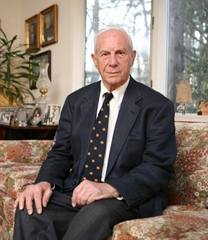
Regent Harry Philips, III
Regent Harry Phillips, III delivered an inspiring keynote address about his belief in WISE as a transformative experience in today’s schools during the WISE Services Coordinators Forum at New Rochelle High School on April 3rd.
Phillips has an extraordinary passion for education. He has been on the Board of Directors of WISE since 1996. He played a pivotal role in the merger of the Greenburgh School Districts that became a highly profiled example as one of the most diverse school systems for the times. Phillips is also a board member of the Westchester Community College Foundation, a past president of his local PTA and a founder and past president of the Woodland High School Scholarship Fund. Since 2000, he has served on the New York State Board of Regents, which covers all education (public, charter, private, and parochial), including colleges and universities. When discussing his role as Regent, Phillips describes himself as a dissident of the Board–a self-proclaimed title that becomes clear for many reasons throughout his address.
The Problem of School Privatization
Phillips began his address with a discussion on the problem of school privatization. Governor Cuomo, who was previously against charter schools, strongly supports them today–a move Phillips disagrees with. “This country is based on public education. I am a big believer in public education,” rallied Phillips. He argued that the problem with charter schools is their profitability: the owners of for-profit charter schools are accepting public schools’ money. Charter schools, unlike public schools, have not been audited on a regular basis. Additionally, while charter schools are inclusive, opening their doors to many groups of students who struggle in public schools (such as disabled students and English language learners), charter schools are not required to be equipped to meet their needs, so most end up back in the public school system. Pro-public schools for these reasons, Phillips champions programs like WISE, which help improve all schools.
It is also a common misconception, according to Phillips, that public schools are failing. Most schools are flourishing, he clarified, but low income public schools are the only ones facing difficulties. A study by Diane Ravitch revealed that when schools below the poverty line are taken out of the sampling, the United States emerges as number one in literacy. New York City, among the most integrated schools in the nation due to neighborhood schools, is in the 80% range of success. Considering these eye-opening statistics, Phillips identified the real problem in education: poverty. “We have to fight this,” urged Phillips, a call to action that brought him back to WISE. WISE, he says, is a way that students can learn the skills to flourish regardless of their home environment. Phillips therefore wishes he could mandate WISE in every school.
The Common Core
Phillips confronted the Common Core, a current controversial topic in education. Voicing his opinion on the matter, Philips said that the “Common Core is a good thing,” but it was implemented wrong. The tests, for one thing, are too hard and long. The decision to make it high stakes for teachers rather than students is also backwards. Mainly, however, Phillips blamed the problems of the Common Core on its hasty implementation. The edTPA, for example, which was started by Linda Darling-Hammond at Stamford University, is being implemented too quickly, which is frustrating schools. Having teachers submit a video of the students in training, one of the edTPA requirements, is such an educational process, however, that it should force the implementation to slow down–something that Phillips advocates. The need for “a longer period of [Common Core] implementation,” he argues, is important. Of the Board of Regents, Phillips said, “We don’t get to get everything right.” He went on to humbly admit, “We really screwed up in this implementation [of the Common Core.] We should apologize. We haven’t done that.” Wrapping up the Common Core discussion on a positive note, Phillips informed educators of the important work the Regents has done. Although the Regents “keep[s] making mistakes,” he says, they have been doing “a lot of good things you don’t hear about.” In regards to the Common Core, he says, they are learning. Changes have already been made to the Regents tests so they will not be scored any harder than they were in the past. Regents control with teacher training is also being changed considerably.
The “Most Right Thing” About Education
After his critical assessment of the Common Core implementation, Phillips discussed what is right about education. “The most right thing [about education] is the teachers,” Phillips acknowledged. He pointed out that until a deal was made with Bloomberg and the unions, any teacher with higher seniority could come in at the last second and take any job they wanted. Phillips emphasized this unfairness and that while “some good things are happening [in education]…more bad things are happening than good.” Phillips offers educators hope. “Education is getting attention,” he said. “People are starting to respect what [teachers and principals] do.”
Phillips believes that WISE is the answer to many of the problems in education. Calling WISE “a transformation,” Phillips anticipates WISE’s prominent role in improving the education system, concluding,” I have the greatest respect for WISE Coordinators who keep the Program going…We [WISE] have a great future.” To the teachers he added, “And I know you do too.”

 Saving...
Saving...